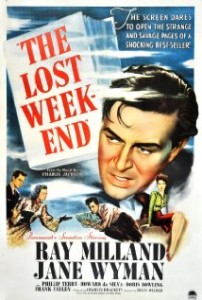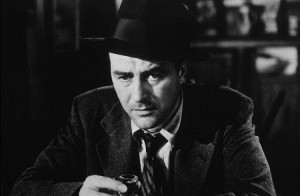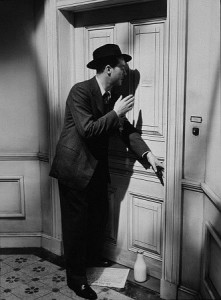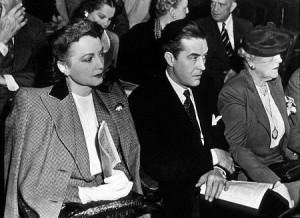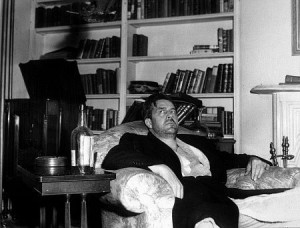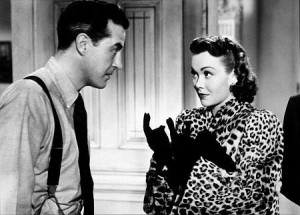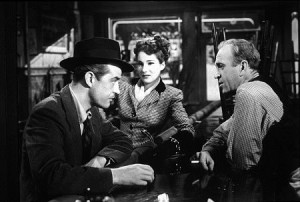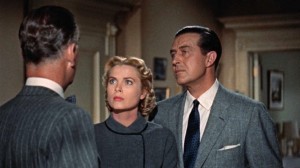The Lost Weekend ***** (1945, Ray Milland, Jane Wyman, Phillip Terry) – Classic Movie Review 1030
Co-writer/director Billy Wilder’s coruscating, much-admired four-Oscar-winning 1945 drama proved Ray Milland’s greatest triumph in the movies and one of director Wilder’s. It won the Oscar for Best Picture and the Grand Prix at the Cannes Film Festival.
Milland won the Best Actor Oscar for his stalwart performance as Don Birnam, a writer who just can’t stop drinking liquor and who is brought to the brink of suicide over a binge drinking long weekend. Long-time alcoholic Birnam has been on the wagon for ten days but his craving gets worse.
Evading a country weekend planned by his brother Wick (Phillip Terry) and girlfriend Helen (Jane Wyman), he begins a four-day bender. Flashbacks tell of his troubles and his resorting to booze for comfort.
Wilder won an Oscar for Best Director and shared another with his regular writing partner Charles Brackett for Best Adapted Screenplay (from the bestselling novel by Charles R Jackson).
Hollywood’s first serious look at alcoholism, and the first ever message movie to win the Best Picture statuette on Oscar night, it survived bumpy early previews and was highly successful and deservedly widely praised, and became influential in prompting studios to undertake more serious movies.
Despite the many other movies since on this subject, The Lost Weekend retains its devastating power as a study of the downward spiral of alcoholism. Accessing all his resources, Wilder directs with consummate skill and ingenuity, employing his habitual noir-style film-making and lofty tone that varies only between the cynical and the bitter, this time without the jokes. Films about alcoholism are never much fun unfortunately.
Wilder was always great with actors, both choosing and directing them. He encourages acting support from a strong team, headed by Jane Wyman as his loyal girlfriend, Howard Da Silva as the barman and Frank Faylen as a male nurse, as well as Doris Dowling, Mary Young, Anita Sharp-Bolster, Lilian Fontaine, Lewis R Russell, Frank Orth, Gisela Werbiseck, Eddie Laughton, Harry Barris, Jayne Hazard, Craig Reynolds, Fred Toones, Clarence Muse, Emmett Vogan, Pat Moriarty, Byron Foulger, Helen Dickson.
It’s easy to underestimate Milland because he made what he did look so smooth and effortless. This is a true Oscar-winning performance, in a role other actors wouldn’t touch and he was nervous about taking, that shows him in the top rank of all-time best movie actors. See him also in top-form action in Hitchcock’s Dial M for Murder.
Wilder claimed the drinks industry offered the Paramount Studio $5 million not to release the film. He added had they offered it to him he would have accepted. Temperance groups also tried to stop the film’s release, as they thought it would encourage drinking!
To prepare for the role, Milland spent a night in Bellevue Hospital as a patient and started eating little since most alcoholics forget to do eat.
An exact duplicate of P.J. Clarke’s, a Third Avenue bar, was built on Stage 5 at Paramount, complete down to the dusty stuffed cat on the top of the payphone.
Miklós Rózsa was nominated for his scores for both this film and Hitchcock’s Spellbound and the same year. A theremin was used in both scores. Spellbound won the Oscar, although Rózsa considered The Lost Weekend the stronger score.
The original novel has the main character troubled by a gay affair, but the script has him suffering from writer’s block.
http://derekwinnert.com/dial-m-for-murder-classic-film-review-82/
http://derekwinnert.com/spellbound-classic-film-review-101/
© Derek Winnert 2014 Classic Movie Review 1030 derekwinnert.com

